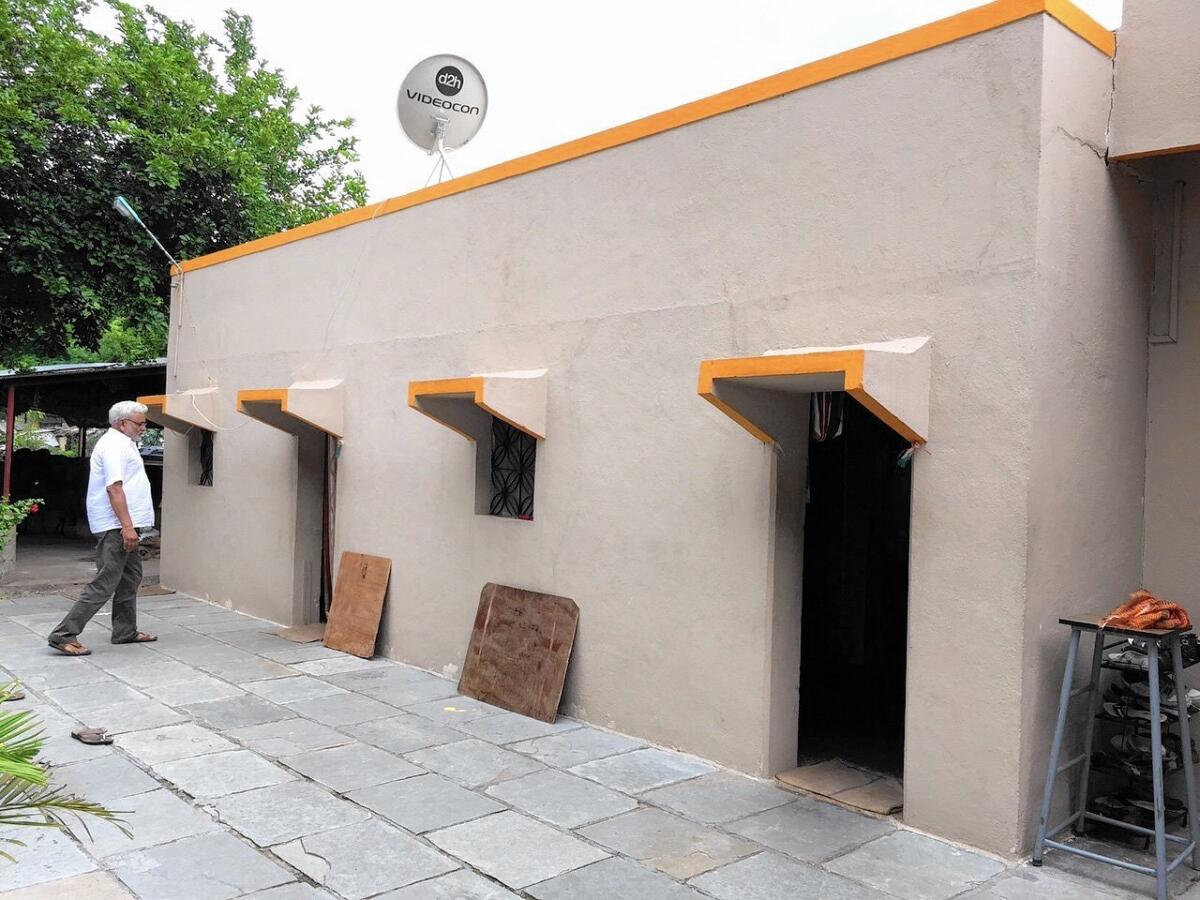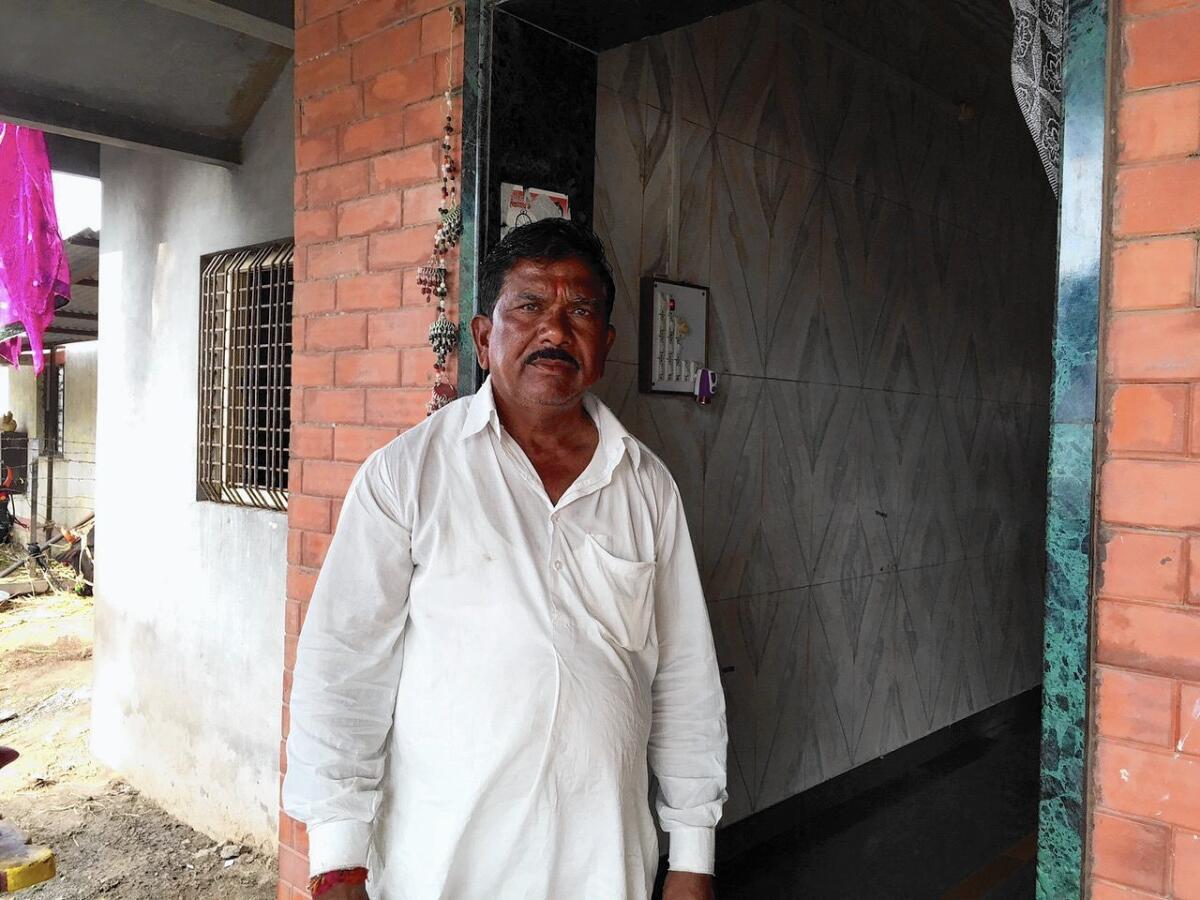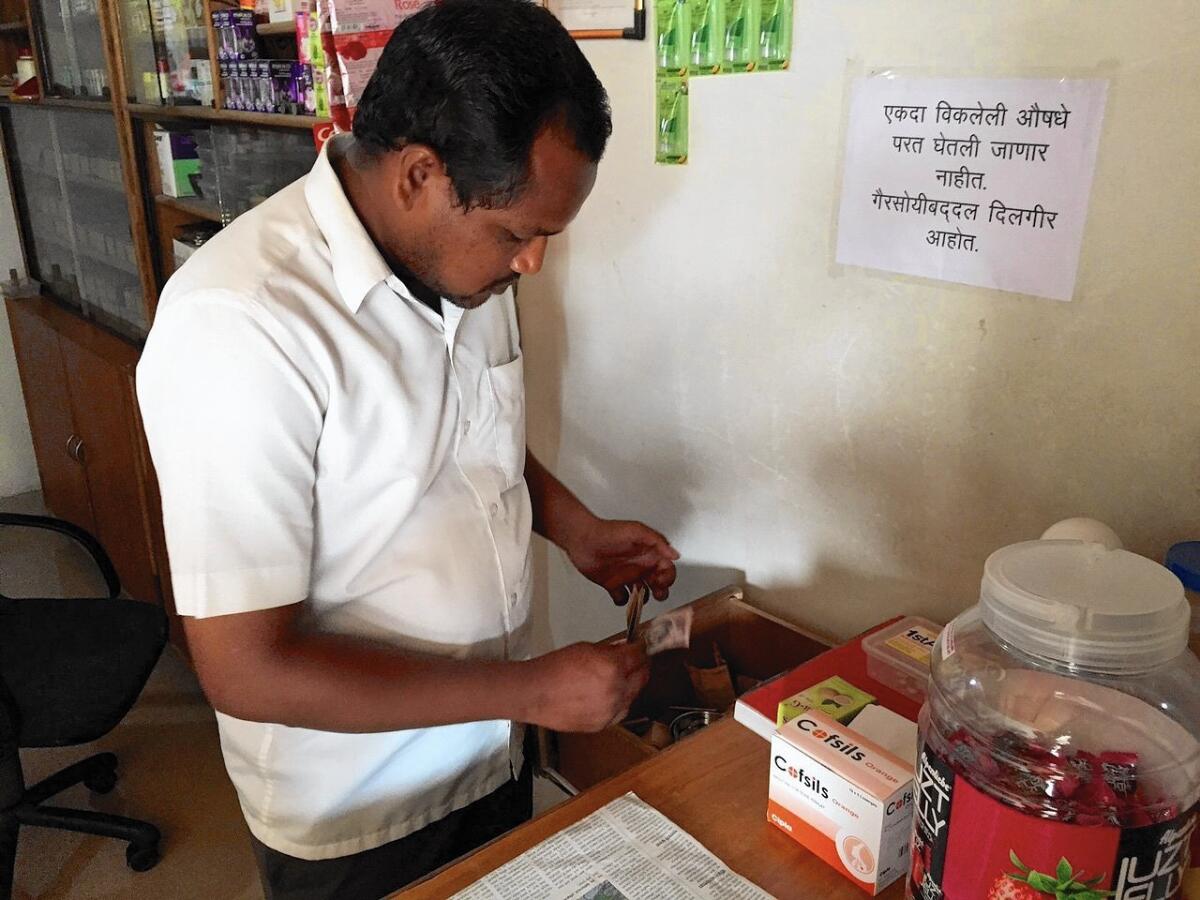Great Read: In India, a legend keeps a town nearly door-free

A home in Shani Shinganapur, India, where nearly all residences have no doors.
- Share via
Reporting from Shani Shinganapur, India — Nanasahib Bankar, a prosperous farmer and entrepreneur in this small temple town, worries about a lot of things: sugar-cane prices, the health of his cattle, the success of his son’s new hotel.
One thing he doesn’t worry about is losing his keys. His house, like nearly all the others here, doesn’t have a door.
Standing under the bare door frame of the red-brick house he shares with 12 family members, arms folded over his protruding belly, the 64-year-old patriarch says simply, “This is the way we have always lived.”
Legend has it that Shani, the Hindu deity to whom the local temple is dedicated, watches over Shani Shinganapur, a town of about 15,000 in western India, preventing crime and punishing thieves.
To install a door with a latch or a cupboard with locks, devotees say, would be to question Lord Shani’s powers — and invite his wrath. Some older residents opt for curtains even for their bedrooms, and most residents don’t lock their cars or motorbikes. Shopkeepers say they sometimes leave cash in their drawers overnight.
The only bank in town has a plexiglass front door but, apart from a safe-deposit box, remains unlocked day and night.

Nanasahib Bankar doesn’t have to worry about losing his keys. His house in Shani Shinganapur doesn’t have a door.
After dark, when the wind rustles the palm trees and sugar-cane fields, Bankar draws a simple gray curtain across his front doorway, holding the billowy fabric in place with a slab of plywood. (The main threat of intrusion, he said, comes from stray dogs and snakes.)
Inside a bedroom, Bankar’s daughter-in-law, Vaishana, a pretty young woman wearing a sari and dangly white earrings, giggles when asked where she keeps her wedding jewelry, her most valuable possession. She reaches under her bed and slides out a battered blue suitcase.
“See,” Bankar says proudly, “it’s not locked and we don’t worry.”
In a land filled with all manner of Hindu shrines, Shani Shinganapur’s peculiar niche has brought it a small measure of fame on India’s temple circuit, drawing thousands of visitors daily to this otherwise-nondescript town 150 miles east of Mumbai.
The origins of the temple are as much a part of local legend as the crime-free image.
Hundreds of years ago — no one seems to know exactly when — the river running through the village coughed up a 5-foot block of black stone. When the stone was tapped, the story goes, blood oozed from its surface.
Locals say no one dared to move the slab until, one night, a farmer dreamed that the stone spoke to him and identified itself as Shani, the Hindu god associated with the planet Saturn. “I want to remain here,” the apparition said, and the next day farmers heaved the stone up to dry land.
Even when I leave home for weddings or holidays, I leave my house open without any security. If anyone does anything, Shani will punish them.
— Nitin S. Shete
When villagers sought to construct an edifice to house the stone, however, there were mishaps. Walls collapsed. Construction workers suffered injuries. The residents decided that no traditional temple could house Shani, so the shrine consists of a simple open-air platform on which the slab now sits — and the villagers followed suit by doing away with doors.
“Why should we also be under the shadows and hidden behind barriers?” says Nitin S. Shete, an engineer and temple trustee. “Our belief is so strong that even when I leave home for weddings or holidays, I leave my house open without any security. If anyone does anything, Shani will punish them.”
Over the years, the lore has grown. Bankar’s grandfather would tell how raiders from another village came one night and made off with a bull. They walked and walked, but when the sun rose they found themselves still in Shani Shinganapur, having wandered in circles, and were captured.
To some, such tales are rank superstition and a ploy for tourists. They say petty crime occurs but temple officials keep the reports quiet, to protect Shani Shinganapur’s reputation.
If the town is so safe, these skeptics ask, why does the temple’s donation box have a lock?
Sukhadev Bajira Shete, who is unrelated to the engineer, began questioning the myth of Shani as a teenager, when his mother’s favorite piece of jewelry — a black and gold necklace that was given to her on her wedding day — was stolen one night from the main room of their house.

Shete, an intense, bearlike man, is now 56 and a staunch atheist. Yet for years he couldn’t install even a sliding door on the family’s tidy concrete house because his father, a longtime temple trustee, forbade it. When his wife came from another village to live with his family, she was uncomfortable with the lack of privacy, suffering through months of sleepless nights.
Only after his father died six years ago did Shete add a sliding metal gate to the house, along with a large padlock.
“A lot of people opposed me when I decided to fix a lock,” he says. “But thefts are getting worse. The temple trustees try to keep these incidents quiet because it would damage the town’s image.”
Five years ago, a visitor from northern India complained that a tour operator had stolen his camera, cellphone and hundreds of dollars in cash while he was praying in the temple. News reports — their veracity impossible to confirm — billed it as the first police case in Shani Shinganapur’s history.
One recent afternoon in the center of town, where lines snake around the stone trapezoid that forms the entrance to the shrine, a pickpocket tried to snatch money from a pilgrim before being apprehended. The suspect, police said, was from out of town.
A more subtle form of thievery has taken root as the town’s celebrity grows and more people flock here from other towns for work.
SIGN UP for the free Great Reads newsletter >>
When cars with out-of-town plates roll along the dusty road toward the temple, teenagers on motorbikes rap on the windows, harassing visitors over parking fees. Prices for garlands, ceremonial oil and other religious offerings have soared, prompting temple leaders to post signs warning devotees about price gouging.
Finally, in September, came an unmistakable sign that reality had pierced the town’s gauzy myth: A police station opened in Shani Shinganapur for the first time.
Two weeks after the ceremonial opening, a shred of cheap pink ribbon, held in place by two strips of masking tape, is still affixed to the door frame of Assistant Police Inspector Prashant Mandale’s office. Yes, Mandale says, the station has doors, but out of respect for local traditions they do not have locks.
Security concerns prompted the establishment of the station, Mandale says. Last year, a bomb blast at a temple in the nearby city of Pune injured half a dozen worshipers.
He says that there has been only one report of theft since he arrived — the pickpocketing — but that the throngs of tourists represent an obvious target.
He shows the way to the station’s small jail cell, which features a compromise: Instead of a lock, the cell door is held shut by a long metal latch, secured by a bolt out of reach of anyone on the inside.
“Probably the only such jail in India,” Mandale says.
Not everyone is happy about the new addition. One shop owner calls it unnecessary and an insult to Shani, but doesn’t want to be named criticizing the police. Others say it was inevitable.
“Things are slowly changing. We didn’t even have curtains for a long time,” says Bankar, the businessman. His son Vikas, with the thriving hotel business, is building a new house for his family.
The plans call for a sliding door.
MORE GREAT READS:
On a chilly beach in Russia, an unlikely surf culture takes root
Jesse is a typical boy in probation-run foster care: unwanted
A failed bronco gets a shot at rodeo redemption
More to Read
Sign up for Essential California
The most important California stories and recommendations in your inbox every morning.
You may occasionally receive promotional content from the Los Angeles Times.











